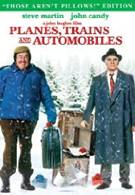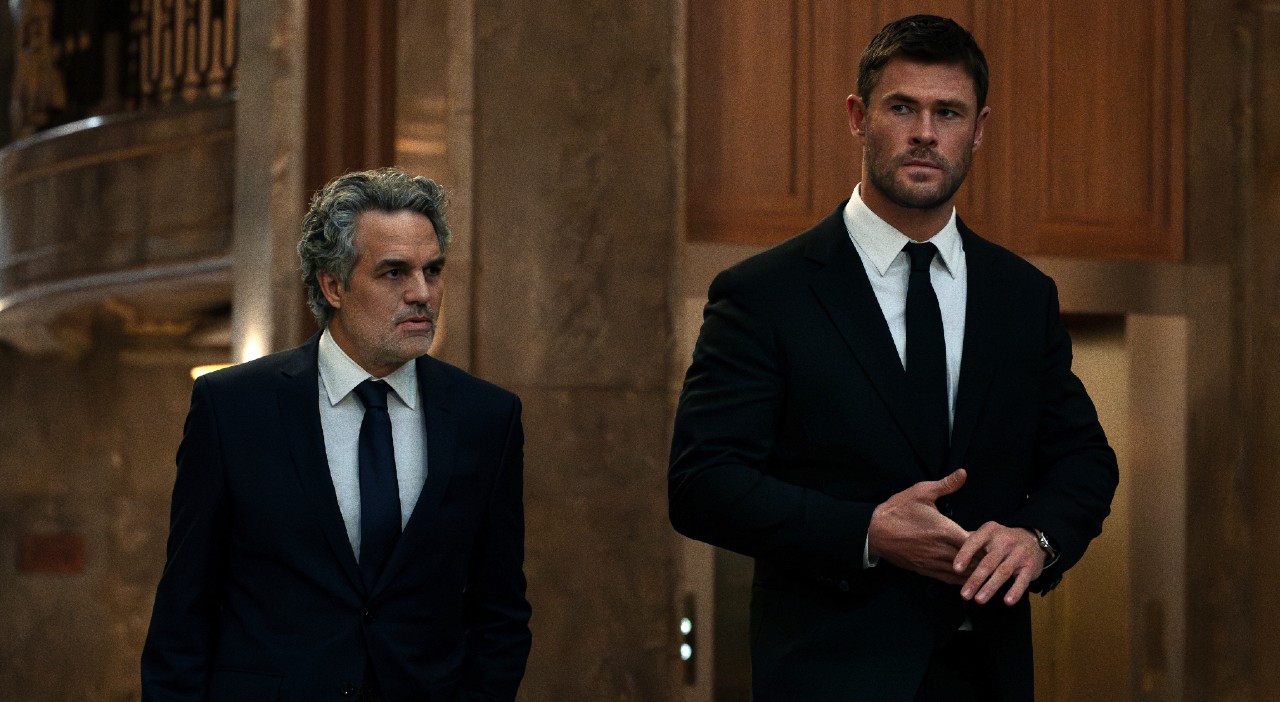Chicago ad executive Neal Page (Steve Martin) just wants to get home to his family for Thanksgiving, and it suddenly seems as though the entire universe is standing in the way of his one simple goal. Flight cancellations due to weather, that damn Kevin Bacon stealing his cab, unhelpful car-rental agents (Edie McClurg), and events so incredible Franz Kafka would think it was Kafka-esque. To add to his ordeal, Neal has reluctantly made a new "friend" and partner in travel hell, an incredibly annoying shower-curtain-ring salesman named Del Griffith (John Candy). Del's the kind of guy who can't stop talking even when there's nothing interesting to talk about, and this is something that Neal points out to him in one of the film's many fine moments of screenwriting. As Michael McKean notes in one of the DVD extras, there's usually some kind of contrivance in "buddy" comedies that forces these "odd couples" to stay together, but writer-director John Hughes just drives right around that by making Del and Neal into characters that exhibit more than two dimensions. He does this with one scene in particular that defines the characters for the rest of the film. Forced to share a single motel bed in the only room in town, Neal is slowly driven to the point of no return after listening to Del trying to clear his sinuses for minutes on end. He goes into an extended rant, explaining in brutal detail every little thing about Del that exasperates him. Until this moment, Candy and Hughes have played Del as a kind of obnoxious caricature, a character that is often the butt of jokes in broad comedies. Who hasn't wanted to yell at someone for being so annoying? So, we vicariously enjoy Neal's tirade and laugh at his very true observations about Del's irritating habits without caring for a moment how the man might feel. But Neal is stopped in his tracks when he sees the hurt expression on Del's face, and so are we. It's one of the late John Candy's best moments as an actor and capitalizes on the very real kindness that seemed to exude from him. With this single moment, Del moves from caricature to character, and his soft-voiced and dignified reply to Neal is completely unexpected.
Del: You wanna hurt me? Go right ahead if it makes you feel any better. I'm an easy target. Yeah, you're right, I talk too much. I also listen too much. I could be a cold-hearted cynic like you... but I don't like to hurt people's feelings. Well, you think what you want about me; I'm not changing. I like... I like me. My wife likes me. My customers like me. 'Cause I'm the real article. What you see is what you get.
Characters in these comedies rarely stand up for themselves after being mocked. When they do, it's usually with more mockery, but here Hughes opts to show us a character who won't stoop to that. Upon hearing this, Neal realizes that he's gone too far. Hughes' script is so good it keeps Neal sympathetic even after his rant, since we know that he's a decent human being just pushed to extremes. Going beyond the situational comedy, Hughes makes us care about these characters and uses Neal's own good nature to keep him traveling with Del.
The "buddy comedy" genre is often a male love story of sorts, and this one is no different. Through one broadly funny ordeal after another we watch as these very different men become friends. What distinguishes this from others in the genre is the undercurrent of melancholy between the laughs. There is a loneliness in Del that is hard to pin down at first, a desperation for human contact. It is this feeling of emptiness set against the social and familial mood of the holidays that keeps the film from being "just a comedy."
Not that there's anything "wrong" with comedy, especially one that is as funny as this one. Memorable scenes and dialogue fill this movie from beginning to end ("YOU'RE GOING THE WRONG WAY!"). Steve Martin only exhibits his "wild and crazy" persona from time to time, focusing instead on making Neal into a believable husband and father who cannot believe what has happened to him. John Candy gives the performance of his career as Del. He's funny, sad, and in the end as lovable as you remember him. The film's final close-up of Candy now feels all the more poignant since his passing. While it's nice to have this film in any form in your personal DVD collection, this "Those Aren't Pillows" edition is really underwhelming. It seems as though Paramount Home Entertainment actually tried to do as little as possible to get this thing out. There is more work in the ugly 3-D slipcase than in anything actually on the DVD.
Visually the film looks better than earlier editions. It is presented in anamorphic widescreen and is enhanced for 16x9 televisions. Special features include the 16-minute “Getting There is Half the Fun,” which has vintage interviews with a mulleted Hughes, Candy, and Martin at a press conference held on the set of the rental car agency. This is mixed with new footage featuring executive producer Neil Machlis, Michael McKean, casting directors Jane Jenkins and Janet Hirshenson, and Edie McClurg. Oddly missing for new interviews is Steve Martin, whose perspective from more than two decades later would've been most welcome. The other two featurettes are very brief tributes (less than five minutes each!) to both Candy and Hughes that seem like afterthoughts at best.
There is a single deleted scene, which is nothing really new if you've ever watched the film on TV. Titled "Airplane Food," it's a short scene that is often shown in television versions depicting Del sitting next to Neal on a plane and pointing out the problems with Neal's dinner. Now, a single scene would be just fine normally, but it has been long rumored that Hughes had shot a gazzilion feet of film and that a three-and-a-half-hour version once existed somewhere in the editing process due to the different ways that the stars and director approached the scenes. It would've been nice to see some of that on this DVD.
Your Daily Blend of Entertainment News
The biggest fault of the DVD is that there is no historical context or perspective. 22 years is a fairly lengthy period of time, and since the release of the film two of its primary creative artists have passed away. Planes, Trains, and Automobiles was an important film in the career of John Hughes, marking a shift from the teen comedies that made him a household name to a period of uncertainty that eventually led to his retirement as a director. For John Candy the film was a high-water mark that would never again be reached. A more considered documentary on the production or a commentary track with Steve Martin would've shed much light on their collaboration and the film's reportedly tumultuous production. As it is, there seems to be room left for Paramount to dip again in 10 years for a new "Collector's Edition" DVD.

